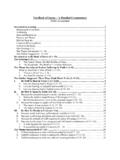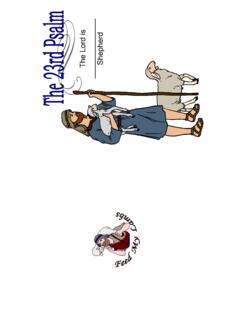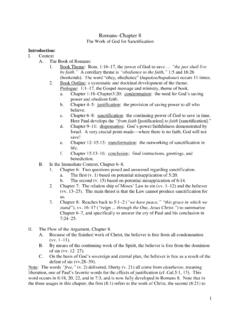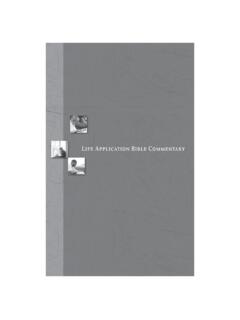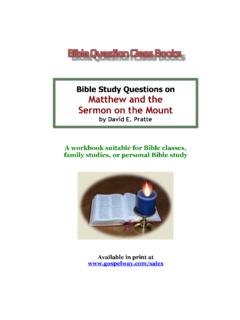Transcription of The Book of James -- Detailed Commentary
1 The Book of James A Detailed Commentary Table of contents Introduction to 2. Background of the Book .. 2. 2. Date and 2. Purpose and 2. Biblical Parallels .. 2. Common Misconceptions .. 3. Outline of the 3. The Greeting (1:1).. 4. The Theme Introduced (1:2 18) .. 4. The Outline Suggested (1:19 20) .. 4. Introduction to the Book of James (1:1 20) .. 5. The Greeting (1:1).. 5. I. The Author: James , the Half Brother of Jesus .. 5. II. The Recipients: My Brethren Fellow Believers .. 5. The Theme Introduced: Endure Suffering by Faith (1:2-18) .. 5. What we should do in time of trial (1:2 12):.. 6. I. Count it all joy (vv. 2 4).. 6. II. Ask God for wisdom (1:5 8).. 6. The Outline Suggested: Three Ways Faith Meets Trials (1:19-20).
2 7. I. Be Swift to Hear in Trials (1:21 2:26) .. 8. A. Let your hearing lead to doing (1:21 27).. 8. B. Let your hearing be impartial and merciful (2:1 13).. 10. C. Let your hearing lead to faithful action (2:14 26).. 11. II. Be Slow to Speak in Trials (3:1-18) .. 13. A. Because the untamed tongue is unruly and destructive (3:1 12) .. 13. 1. Notice the relative insignificance of the tongue (3:3 5a).. 13. 2. Behold the destructive force of the untamed tongue (3:5b 12).. 14. B. Because the tongue is capable of two kinds of wisdom (3:13 18).. 14. 1. The nature of true wisdom (3:13, 17 18) .. 14. 2. The nature of devilish wisdom (3:14 16).. 14. III. Be Slow To Wrath in Trials (4:1-5:6).
3 15. A. Because wrath is divisive, self-centered, worldly (4:1 5).. 15. B. Because wrath brings discipline and correction from God (4:6 10) .. 16. C. Because the attitude of wrath assumes the place of a judge (4:11 12) .. 16. D. Because wrath comes from arrogance and will lead to condemnation (4:13 5:6) .. 17. 1. In making plans for success (4:13 17) .. 17. 2. In accumulating wealth for security (5:1 6).. 17. The Theme Summarized (5:7-20) .. 19. A. Faithful endurance in trials will be rewarded by God (5:7 12).. 19. B. Faithful endurance in trials is attained by effective prayer (5:13 18).. 19. C. Faithful endurance in trials may deliver wavering brothers (5:19 20).. 20. The Book of James A Detailed Commentary Introduction to James Background of the Book The Epistle of James is one of the general epistles, including 1 and 2 Peter, 1, 2 and 3.
4 John, and Jude. These letters were sent out as circular epistles to be passed around and read in several locations. Authorship The writer identifies himself only as James , a bondservant of God and of the Lord Jesus Christ (Jam 1:1). Out of the four men named James in the New Testament, only two have ever been suggested as the author James , the brother of John (sons of Zebedee), and James , the Lord's half brother. Since the brother of John was martyred very early, about 44 (Act 12:2), he is ruled out. The other James , the Lord's half brother, later became the leader of the Jerusalem church (see Act 12:17; 15:13; 21:18). There are parallels in the language of this epistle and the speech of James at the Jerusalem council (compare Jam 1:1 and Act 15:23; Jam 1:16, 19.)
5 And Act 15:25; Jam 1:27 and Act 15:14, 29; Jam 2:5 and Act 15:13, 14, 25; Jam 2:7 and Act 15:17; Jam 5:19 20 and Act 15:19). The author speaks with a tone of authority befitting the position of James , the half brother of Jesus. The high spiritual tone of the book fits with the quote of Eusebius that distinguished this James by adding the title, the Just.. Date and Destination This is considered to be the earliest of the New Testament epistles. Nothing in the epistle goes beyond Acts 9. The scattered Jewish believers of the persecution of Act 8:1 4 appear to be the recipients (Jam 1:1). The Church was still meeting in synagogues, as suggested by Jam 2:2, where assembly is sunagogen.
6 These considerations all point to a date as early as 34 35 Purpose and Theme It has long been a common misperception that James has no unified theme and is simply a series of aphorisms or maxims strung together in what was called in the ancient world a string of pearls. The epistle, however, clearly indicates the writer's purpose to develop a primary theme. That theme is that believers should meet trials with faith and wisdom, resulting in joy (Jam 1:2 5). The development of this theme is along three lines suggested in verse 1:19, which become the outline of the book that we will see later. In essence, the letter is that of a sermon in written form. The theme is mentioned at the beginning (1:2 5) and the end (5:7 11) in what might be called grammatical bookends.
7 A strong promise is given at the beginning, of the eternal benefit of meeting trials and temptations with faith and wisdom (1:12). This promise is reinforced at the end of the book (5:19 20) by a practical illustration of the intercession of one believer in behalf of another. Biblical Parallels There are many parallels between the literature of the New Testament and that of the Old. The book of James is particularly related to the book of Job in the Old Testament. Both are considered the earliest book of each Testament. Both deal with the question of suffering in the lives of believers. It seems significant that God would choose this topic to deal with in the earliest books of both Testaments.
8 This is a problem that every believer has to deal with some time in life. In answer to the age-old question: Why does God allow His children to suffer? . the book of Job would answer, because we are part of a spiritual war raging behind the scenes, Basic Training bible Ministries Page 2. The Book of James A Detailed Commentary in which our faith vindicates God (Job 42:8b), and James would answer, because God works through trial to purify and refine our faith in order to bring blessings in time and reward in eternity (Jam 1:12). We can also see several parallels between James and the Sermon on the Mount, which James may well have heard. Jesus commends spiritual poverty (Mat 5:3) as does James (1:9.)
9 10). Jesus commends meekness (Mat. 5:5) as does James (1:21). Jesus commends the merciful (Mat 5:7) as does James (2:13). Jesus commends the peacemakers (Mat 5:9) as does James (3:18). Jesus warns of the danger of taking oaths (Mat 5:34 37), and James warns of the same (5:12) to the point of quoting the words of Jesus. Jesus warns of the deception of riches (Mat 6:19) to which James agrees (5:2). Jesus says, a tree is known by its fruit (Mat 7:16) to which James again agrees (3:12). In fact, the more one reads the Sermon on the Mount and the book of James , the more parallels begin to emerge. Common Misconceptions We have already seen that many commentators miss the theme that runs through the book of James .
10 We have also noted that to approach the epistle as a series of spiritual sayings (as in the book of Proverbs) is to miss its purpose and unity. But the greatest error, by far, is in the idea that the book of James is written to unbelievers, and that it presents to them the way of salvation. Nothing could be further from the stated purpose of the author himself. That he is writing to believers is evident throughout by the use of the word brethren or beloved brethren at least 19 times! The erroneous approach seems to come from a misunderstanding of how James uses the word save. This word occurs five times in the book. The tone for James ' usage is set in 1:21, where believers are exhorted to receive the Word of God in meekness as the means of delivering their souls in times of trial.
